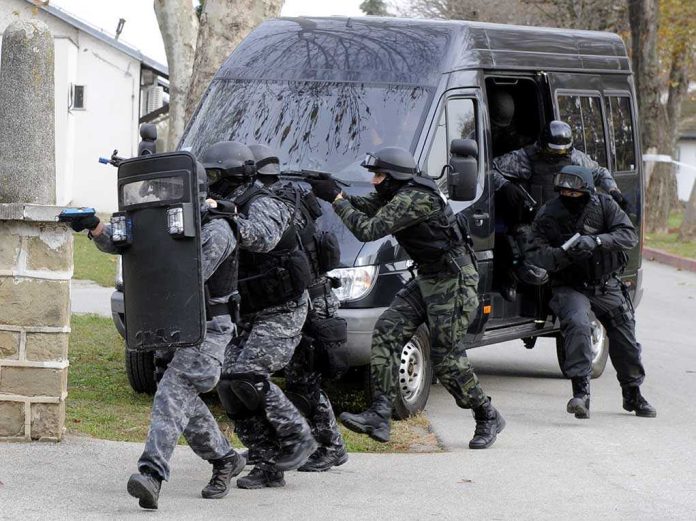
Brazilian authorities deployed 2,500 police officers and soldiers in a single raid that left 60 suspects dead, marking one of the deadliest gang operations in Rio de Janeiro’s violent history.
Story Snapshot
- Massive joint operation involved 2,500 Brazilian police and military personnel targeting drug trafficking networks
- At least 60 suspected gang members killed in fierce gun battles during the raid
- 81 suspects arrested as authorities cracked down on organized crime in Rio de Janeiro
- Operation represents one of the largest anti-gang efforts in recent Brazilian law enforcement history
Unprecedented Scale of Anti-Gang Operation
Brazilian law enforcement launched an extraordinary display of force Tuesday morning when 2,500 police officers and soldiers descended on drug trafficking territories in Rio de Janeiro. The sheer magnitude of personnel deployed signals the government’s escalating commitment to dismantling organized crime networks that have plagued the city for decades. This operation dwarfs typical anti-gang raids, representing a military-style approach to urban crime fighting that has become increasingly common in Brazil’s most dangerous areas.
Deadly Confrontations Rock Rio Streets
Intense firefights erupted as gang members resisted the massive police incursion, resulting in at least 60 suspect deaths and transforming Rio neighborhoods into urban battlegrounds. The high casualty count reflects both the desperation of cornered criminals and the overwhelming firepower brought by Brazilian security forces. Such deadly encounters have become tragically routine in Rio, where heavily armed drug cartels regularly engage in warfare with equally militarized police units.
The 81 arrests accompanying these fatal shootouts demonstrate that many gang members chose surrender over certain death when faced with insurmountable odds. Brazilian authorities have not released casualty figures for law enforcement personnel, though such large-scale operations typically result in officer injuries or deaths given the sophisticated weaponry employed by drug trafficking organizations.
Brazil’s Ongoing War Against Organized Crime
Rio de Janeiro has become synonymous with drug violence as powerful cartels control vast territories within the city, essentially creating parallel governments in favela communities. These criminal organizations generate billions in revenue through cocaine trafficking, often outgunning local police with military-grade weapons and recruiting impoverished youth into their ranks. The cycle of violence has claimed thousands of lives annually, making Rio one of the world’s most dangerous urban areas.
Brazilian President Luiz Inácio Lula da Silva’s administration faces mounting pressure to address the security crisis that has persisted through multiple governments. Previous attempts at pacification have yielded mixed results, with some territories experiencing temporary peace before violence inevitably resurges. The scale of Tuesday’s operation suggests authorities are abandoning gradual approaches in favor of overwhelming force tactics.
Questions About Sustainable Solutions
While the arrest of 81 suspects and elimination of 60 others may temporarily disrupt criminal operations, history suggests these victories often prove pyrrhic in Brazil’s drug war. New leaders typically emerge within weeks to fill power vacuums, and the underlying conditions that fuel gang recruitment poverty, lack of opportunity, and weak institutions remain largely unchanged. The militarized approach, while satisfying public demands for action, has yet to produce lasting security improvements in Brazilian cities.
The international community watches Brazil’s heavy-handed tactics with concern, particularly regarding human rights implications of operations resulting in such high death tolls. However, Brazilian officials argue that extreme measures become necessary when dealing with heavily armed criminal enterprises that terrorize civilian populations and undermine state authority through violence and corruption.
Sources:
Over 130 Killed in Bloody Crackdown on Drug Gangs in Rio de Janeiro




